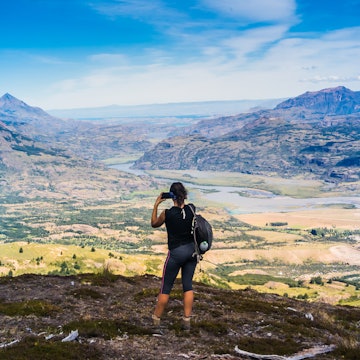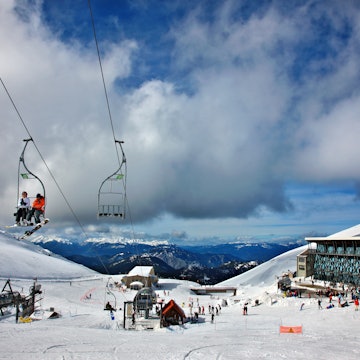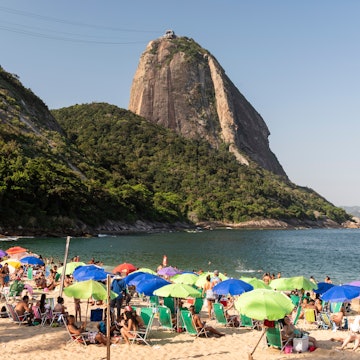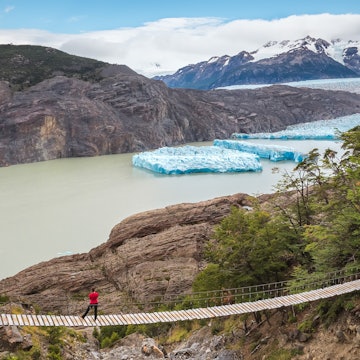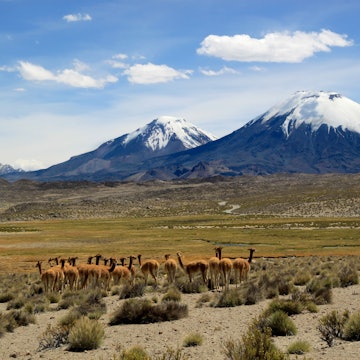

From kayaking to horseback riding through the pampas, here are the best outdoor adventures in Patagonia © Dudarev Mikhail / Shutterstock
It's hard to think of another place on the planet that offers as much scope for varied outdoor adventure as Patagonia – a vast, sparsely populated slice of southern Chile and Argentina bristling with the Andes mountain range and crisscrossed with sinuous ribbons of glacial rivers.
Maybe you want to experience world-class white water rafting, kayak past bobbing icebergs or paddle through fjords. You might be looking to climb sheer granite or walls of ice, or to hike across glaciers, mountains and boundless steppe on foot. Whatever outdoor activity you're looking for, Patagonia has it. Here are the region's very best.
1. Kayak in lakes, through fjords, and among icebergs
There are some superb kayaking destinations in Patagonia, particularly in the Chilean half, with its multitude of fjords, pristine rivers, and glacial lakes. Besides international operators such as Swoop Patagonia arranging multiday kayaking adventures on Chile's Río Baker, in Parque Nacional Pumalín and Parque Nacional Torres del Paine, there are local operators who offer day trips in popular locales.
In Puerto Río Tranquilo, you can kayak to the Capilla de Mármol; in Puerto Bertrand, Baker Patagonia runs white water kayak trips on Río Baker; Kayak en Patagonia takes you paddling among the house-sized icebergs on Lago Grey in Torres del Paine; and Kayak Santa Cruz runs guided kayaking trips past Glaciar Perito Moreno. If you're looking for multiday sea kayaking trips, Alsur Expediciones and Ko Kayak can help you explore the fjords of Parque Nacional Pumalín. Various operators in Esquel, Argentina, run gentler day outings on Lago Verde and other lakes in the Futaleufú valley.
2. Choose from unparalleled hiking options
Patagonia's multitude of national parks provide unparalleled adventure for those coming to explore pristine wilderness on foot, whether you're looking for grueling multiday treks past glacial lakes and across mountain passes, or you prefer gentle day hikes beneath the shade of Chile's and Argentina's towering alerce trees or through southern beech forest. Perhaps you'll choose to do scenic day hikes from El Chaltén, in Parque Nacional Pumalín Douglas Tompkins, or in Parque Nacional Tierra del Fuego while based in Ushuaia; multiday hut-to-hut (or campsite-to-campsite) treks in Parque Nacional Torres del Paine; or camping wild and wayfaring across Isla Navarino or the Áviles river valley in Parque Nacional Patagonia.
Planning tips: Accommodations in popular national parks must be booked many weeks or even months in advance for the December to February high season; Torres del Paine National Park in particular only allows hikers with a pre-booked itinerary and accommodation.
If trekking off the beaten track, make sure someone knows your proposed route, be prepared for four seasons in one day, even at the height of summer, and make sure your tent is sturdy enough to withstand the fierce Patagonian wind – la Escoba de Dios (God's Broom).

3. Get a taste of Patagonia's world-class fly-fishing
Aysén (north Chilean Patagonia) offers world-class fly-fishing, particularly for rainbow and brown trout, with fly-fishing lodges such as the Cinco Rios Lodge, Patagonian BaseCamp, and Coyhaique River Lodge dotted around in the wilderness along the Palena and Simpson rivers, accessed from the city of Coyhaique. In Argentina, keen fishers head for the likes of Kau Tapen Lodge and Aurelia Lodge in Tierra del Fuego to try their hand at fly-fishing on the Rio Grande, home of the world's biggest sea-run brown trout and golden dorado.
Planning tip: You need a license to fish in Patagonia, but high-end lodges tend to organize permits for their anglers and provide you with all necessary equipment. Fly-fishing season is typically from October to April.
4. Live like a gaucho with a horseback ride in the pampas
Given how Patagonia and its seemingly endless pampas (grasslands) stretching towards the horizon have long been equated with southern cowboys (gauchos in Argentina, huasos in Chile), it's perhaps unsurprising that equestrian adventures are easy to arrange, especially if you're already an experienced rider. But even if you're not, reputable operators in popular Patagonian destinations such as Puerto Natales (Chile) and El Calafate (Argentina) can help arrange horseback riding for beginners and even overnight estancia (ranch) stays, coupled with traditional Patagonian cordero al palo (spit-roasted lamb). Estancias around El Calafate in Argentina include Estancia Cristina, Estancia 25 de Mayo, and Estancia Nibepo Aike, while Chile's Puerto Natales is a good jumping-off point for Estancia La Peninsula and Estancia Bahía Esperanza, among others.
If you're just looking for a day ride, established horseback riding outfits include Cabalgatas del Glaciar in El Calafate and Baqueano Zamora in Puerto Natales, the latter offering day rides in Torres del Paine National Park. For the world's southernmost horseback riding against the backdrop of mountains, get in touch with Ushuaia's Baqueanos de Tierra del Fuego.

5. White water adventures abound for any level
Every southern summer, between December and March, the sunny mountain town of Futaleufú in Chile's Aysén region (northern Patagonia) attracts adventurers in search of watery thrills. One of the world's best rivers for white water rafting, the Futaleufú offers Class IV and V rapids challenging enough for any expert river junkie. Even if you've never done white water rafting before, as long as you're a confident swimmer, you may ride the rollercoaster of river rapids under the instruction of expert river guides.
Established outfits such as Bochinche Expediciones and Patagonia Elements organize safety-conscious half-day rafting trips on the river. You can also try cata-rafting, where you alternate between floating along the scenic, granite-walled canyon on impossibly turquoise waters and being drenched head-to-foot as the inflatable raft collides with massive waves. Be prepared – the rafting guide at the back of the raft will shout out for you to row as if your life depends on it. Safety equipment is provided, and though rafts occasionally flip – this is a wild river, after all – you're taught what to do in case you fall out of the raft, and it's a thrill like no other. The same companies also organize whitewater kayaking outings both for beginners and intermediate kayakers.
If this sounds a bit too wild and energetic, across the border from Futaleufú, tiny Trevelin is a good base for a gentler experience on the Corcovado river, its Class II, III and IV rapids alternately offering tranquil floating through southern cypress forest and white water-induced adrenaline thrills. Corcovado Rafting arranges spray-drenched half-days on the river.
6. Mountain biking is just starting to take off
Mountain biking is slowly taking off in Patagonia, and traffic-free dirt tracks and rugged mountain trails have great potential for two-wheelers. However, in many cases, you're looking at a DIY adventure since dedicated mountain biking operators are few and far between. You can rent mountain bikes from Patagonia Rent A Bike in Puerto Natales, Baft Travel in El Calafate, Ushuaia Extremo Rental in Ushuaia, and some guesthouses in Futaleufú and Esquel, among other places.
International multi-activity outfits such as Swoop Patagonia can help organize multiday mountain biking adventures in Torres del Paine National Park; though bikes are not allowed on the "W" trail, they are free to use the network of dirt roads that link up estancias on the park's outskirts, as well as horseback riding trails.
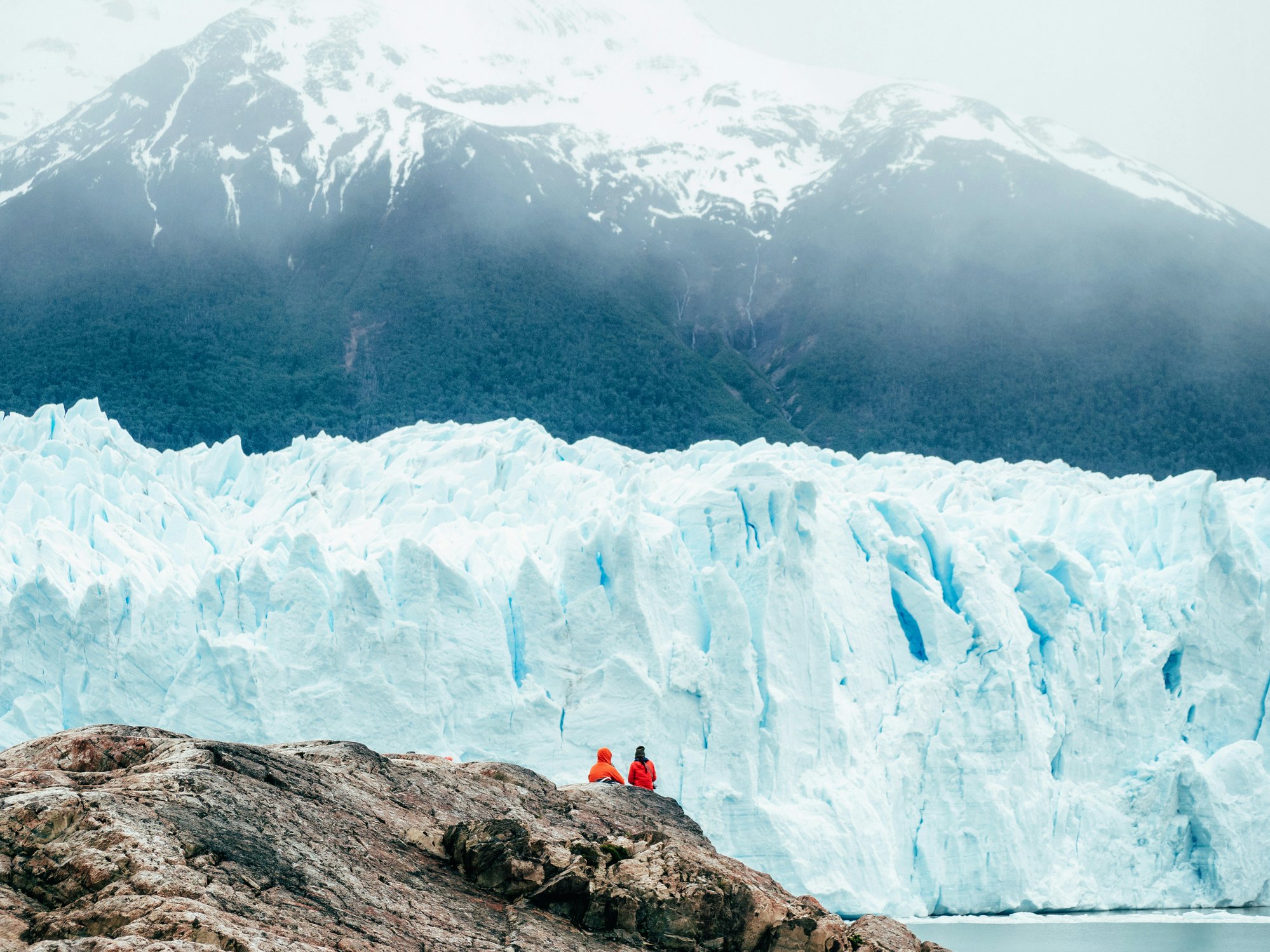
7. Go ice climbing or ice hiking
You may have seen some of Patagonia's most impressive glaciers from boats or scenic viewpoints. But you get an even greater appreciation for these frozen rivers and monolithic walls of ice if you get up close and personal with them.
In Chile's Aysén region, tiny Puerto Río Tranquilo is the jumping-off point for half-day ice hikes on Glaciar Exploradores, led by El Puesto Expediciones, where you get to clack along the icefield with crampons attached to your boots whilst holding an ice ax. Across the border, several tour operators in Argentina's El Calafate arrange multi-activity trips to Glaciar Perito Moreno – Argentina's most accessible and arguably most impressive glacier. These days out involve a couple of hours' walk on the glacier, along with boat trips and picnics overlooking its mighty icy face. Chaltén Mountain Guides in El Chaltén teaches basic skills on two- and three-day ice climbing courses between January and April, with crampons, ice axes and other safety equipment included. Fitz Roy Expediciones runs tough but rewarding day treks on Glaciar Cagliero, as well as demanding week-long crossings of the Southern Ice Field, which involves glacier trekking and camping directly on the ice.
8. Pick from three superb rock climbing destinations
There are three excellent rock climbing destinations in Patagonia. Piedra Parada and Butreria Canyon, some 85km (53 miles) northeast of Esquel in northern Patagonia (Argentina), is one of the best places in Argentina for sports climbing, with over 300 climbing routes bisecting the volcanic tuff. Expert climbers can tackle the multipitch routes up to the pinnacle of Piedra Parada itself – a 200m-high rock (656ft-high) in the middle of the steppe.
Farther south, the tiny town of El Chaltén is renowned as a world-class climbing and bouldering destination, with hundreds of routes to suit climbers of all abilities – from straightforward sport climbing to epic, multiday climbing routes up to the Fitz Roy and Cerro Torre summits. Patagonia Ascent and Mountaineering Patagonia are two climbing operators offering instruction to novice climbers, from half-day tasters to multiday climbing courses. Experienced climbers must register with the park rangers on arrival and pick up a free climbing permit to tackle Mt Fitz Roy and other routes.
Across the border in Chile, the granite trident peaks of Las Torres in the Parque Nacional Torres del Paine throw down the gauntlet to the most experienced of climbers. You need to be an expert in order to tackle the sheer granite rock, faced with fierce Patagonian winds and unpredictable weather. To climb Las Torres, you need permission from the Chilean foreign ministry – bring their written response, passport, and climbing insurance to pick up a free permit from the national park headquarters.
Planning tip: Climbing season for southern Patagonia is December to February; for Piedra Parada, it's longer. Weather is a big factor, which is why climbers often spend weeks camping out during the southern summer, waiting for the ideal window of opportunity.
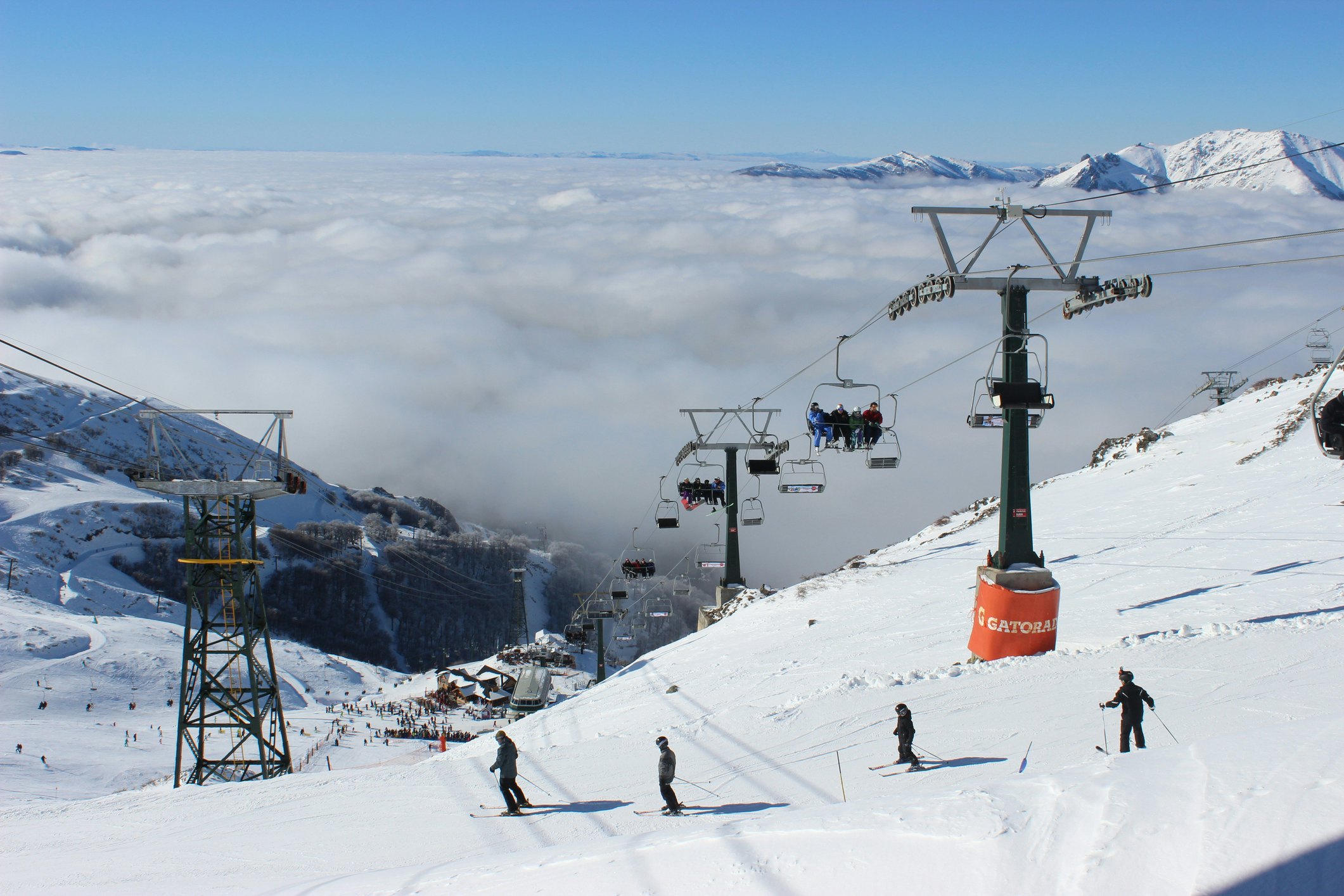
9. Skiing and snowboarding is best on the Argentina side
Unlike Chile's Lake District, Chilean Patagonia doesn't have any ski slopes to speak of, whereas the dry, continental climate in Argentina, on the east side of the Andes, lends itself well to epic snowfall during the June to September downhill skiing season – which extends into October for backcountry skiers and splitboarders.
La Hoya, near Esquel, named after the glacier it sits on, has 24 runs to suit all skiing abilities, plus nine chair and drag lifts. There are 26km (16 miles) of piste, the slopes are uncrowded, and the powder is amazing – particularly if you're an expert off-piste and backcountry enthusiast.
For extra bragging rights, head for Tierra del Fuego's southernmost city, Ushuaia, and hit the slopes at the world's southernmost ski resort, Cerro Castor, with its superb views of the Beagle Channel, ten chair and surface lifts, and 28 ski runs, split pretty evenly between expert, intermediate, and beginner skiers. You can also whizz down Glacial Martial, with its single chair lift, three intermediate runs, one expert and one beginner.
While Bariloche is in Argentina's Lake District (rather than Patagonia), it deserves a mention for Cerro Catedral – arguably Argentina's best ski resort – with 120km (75 miles) of piste catering to snow bunnies of all abilities, 38 ski lifts and a dedicated ski and snowboard park for freestylers, not to mention stupendous views of Parque Nacional Nahuel Huapi, and a backcountry hut-to-hut skiing system.
Planning tip: Ski equipment is rented in outdoor gear shops in the respective ski towns, and during ski season, frequent minibuses connect the towns to the slopes.
10. Go on a husky sledding adventure
We normally associate husky sledding with the far north – the Arctic reaches of Scandinavia, Canada, Alaska. But where there's snow, there are snow dogs. In the Valle de Lobos, 18km (11 miles) northeast of Ushuaia, off the main highway, local operator Gato Curuchet organizes short mushing outings with his husky teams. If you're looking for longer husky adventures, head to Aurora Austral, near Villarica in Chile's Lake District, where German operator Konrad Jacob offers anything from day introductions to mushing to multiday husky-sledding tours of Araucanía, and an epic crossing of the Andes, where you're in charge of your own dog team.








